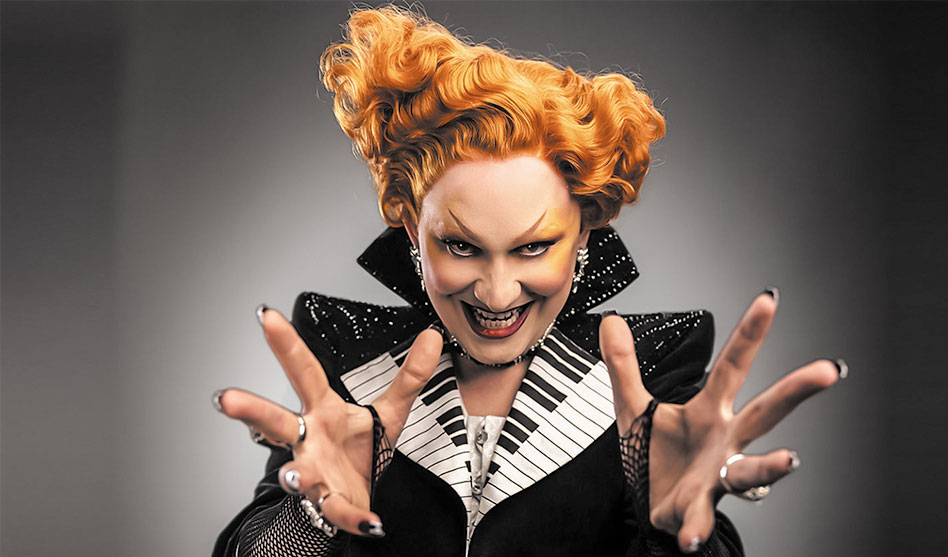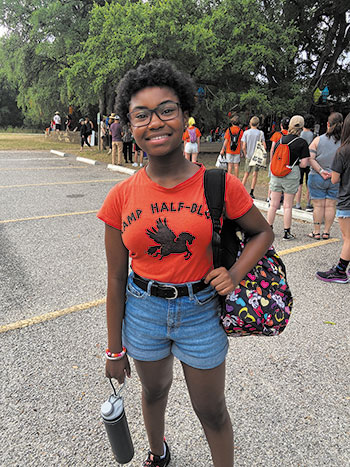Finding community through the inclusive world of fandoms

Jinkz Monsoon as Maestro in ‘Doctor Who’
AUBREE CALVIN |. Special Contributor
I’m an ’80s-born lifelong science fiction nerd. And despite my love of both “Star”-themed franchises, the show closest to my heart is Doctor Who. The iconic sexagenarian British serial is wrapping up the queerest season (that “series” for my U.K. friends) it has ever had.
Russell T. Davies, the openly gay creator of the original Queer as Folk, is in the midst of his second turn as Dr. Who showrunner. His seasons have never shied away from queer characters and the occasional plot point, but his return has taken the LGBTQ inclusivity to a new level.
Ncuti Gatwa is the first Black and openly queer actor to play the titular character. The Doctor himself is canonically bi, much to the chagrin of the more conservative fans. The only significant villain so far this season was played by drag queen Jinx Monsoon. And during the 60th anniversary special, Yasmin Finney, a visibly trans actress, had a significant role in a storyline that wasn’t exclusively about her identity.
To non-Whovians — you unfortunate souls who don’t watch the show or, heaven forbid, have never heard of it — I’m guessing little of what I wrote made sense to you. But that’s okay.
Online, I have found an entire world of queer Whovians who love to share their interesting DIY costumes and projects, debate the meanings of plots and generally over-analyze every second of every episode. Doctor Who has helped me find a community of like-minded queer folk who “get” me. My wife and child are especially grateful because it gives them a break from hearing all my plot and character rants.
My nonbinary teen could tell you a similar story about their love for the Percy Jackson books, another series with a significant queer teen/YA following. Reading those stories helped them understand their identity and fed their love of classic mythology.

Corinne Calvin found her fandom home in the Percy Jackson series and Camp Half Blood.
Last year, my kid went to Camp Half Blood in Austin, a weeklong Percy Jackson roleplaying camp. It was the first time they were able to connect with other kids like them with similar identities, interests and hobbies. That group of friends has chatted all year, forming such a tight-knit bond that they coordinated their schedules to ensure they’re all at camp the same week this year.
That’s the potential power of fandom communities. No matter if it’s your favorite film or show franchise, game, sport, etc., it feels good to be able to connect with others that share your passion and can relate to how we’re existing as a minority group among a hostile majority.
We know it feels harder to make friends these days, and social connections get especially challenging the older we get. It is the current conversation about the loneliness epidemic, if you will.
For those of us with social anxieties, who are neurodivergent or who have other difficulties organically connecting with people, the smaller groups and common interest that comes with the love of a piece of pop culture can make it easier for us to interact and find things to talk about. And that can potentially grow into friendships that aren’t solely fandom-based.
Fandoms can be a great way to find or build an inclusive queer community. They offer camaraderie for those of us who may be on the nerdier side of queer life. Even with pop culture that’s predominantly straight focused, there’s always queer subtext, characters or themes that serve as gathering points.
FAN EXPO 2024 is June 7-9 at the Kay Bailey Hutchison Convention Center in downtown Dallas. Formerly Dallas Comic Con, FAN EXPO is a celebration of comics, anime, gaming, fantasy and science fiction. I don’t think it’s intentional that it is occurring during Pride Month, but I do think it is a welcome addition to this month’s calendar of events.
As the larger convention industry has grown and matured, it’s made great strides to craft an experience that is safer, more diverse and more welcoming for the disabled, women, people of color, LGBTQ, etc. The stereotype of the geeky, Simpsons Comic Book Guy is long dead and most conventions, unless explicitly stated, make efforts to craft a largely family-friendly environment.
Although I can’t highlight them all, here’s a few expo events that I’m looking forward to:
- “Category is … Magical Person Realness,” which discusses LGBTQ characters in anime, manga and graphic novels, as well queer coding and historical queer censorship.
- “Fight the Power — With Powers: Representation of Black Heroes Across the Multiverse of Marvel,” which looks at how relating to Black characters can help fans navigate society, discrimination, and mental health.
- “Staying with Your Bestie: A Spotlight on Geena Davis and Susan Sarandon,” a conversation with the iconic actresses about the legacy of Thelma and Louise, a movie with long-debated queer subtext and lesbian theming.
Whether you’re attending FAN EXPO or not, if you’re looking for a community of like-minded queers, maybe start with that movie, book or game you obsess about the most.

